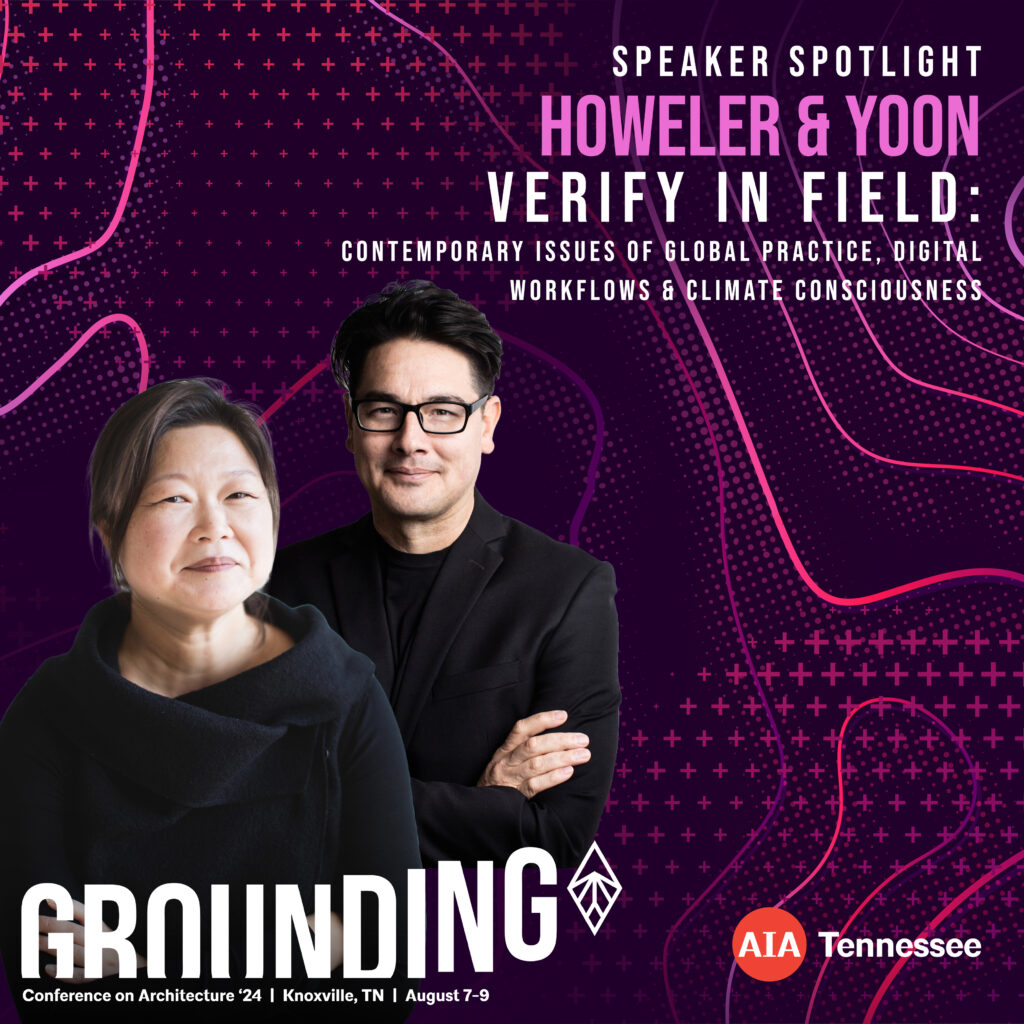Speaker Spotlight: Eric Höweler, FAIA, LEED AP and J. Meejin Yoon, AIA FAAR
2024 AIA Tennessee Conference Speaker

Eric and Meejin are co-founders and partners of Höweler + Yoon Architecture, based in Boston, Massachusetts. Their work has been exhibited widely, including at the Los Angeles Museum of Contemporary Art, the Vitra Design Museum in Weil am Rhein, the Museum of Modern Art, the Smithsonian Cooper Hewitt National Design Museum in New York City and the Venice Biennale. Their hands-on approach to design have produced innovative and engaging work and covers various scales of architecture, memorials, and interactive landscapes.
As a counterpart to the architecture practice, Meejin is also the Gale and Ira Drukier Dean of Cornell University’s College of Architecture, Art, and Planning, and formerly Head of the Department of Architecture at MIT. As an educator, she is committed to advancing pedagogy, research, and practice to expand new knowledge and imaginaries across fields and disciplines. Meejin’s design research investigates the intersections between architecture, technology, and public space.
Eric is also professor in Architecture at the Harvard University Graduate School of Design, where he is the Program Director for the Masters of Architecture Program. Eric’s design work and research focuses on building technology integration and material systems. His projects range from cultural buildings and mixed-use residential buildings, to public spaces and interactive environments.
Together at this year’s conference, they will present Verify In Field: Contemporary Modes of Practice in the Context of Contemporary Issues of Global Practice, Digital Workflows, and Climate Consciousness. Drawing on the titles of their previous books, Expanded Practice, from 2009, and Verify in Field, 2023, they will describe a mode of practicing that expands conventional definitions of architectural practice as well as offers a mode of design/research that incorporates topics of close collaboration with builders, fabricators, and craftspeople into the design process to form a feedback loop between conception and construction.
Learn more about Höweler + Yoon in our Q&A below.

Referencing the conference theme of Grounding, what keeps you grounded in your personal or professional life?
We love the theme of Grounding that has been selected for the conference. It resonates on many levels with our interests and our values. In a literal way, the idea of architecture bearing on the ground and forces reaching the ground makes us think about what we call a tectonic imagination. How we imagine things, and how they are made, and how they perform. We have been thinking about force and form, and this is one of the drivers for the Collier Memorial at MIT, where the idea of “Collier Strong” and “MIT Strong” translated into a unique stone vault structure where the flow of forces is manifested by the arched geometries of the memorial and resolved in the foundations. On a conceptual level, the idea of grounding resonates with ideas of place and terroir- the way the soil conditions and local climates make a wine taste. Even as we work globally, and ship materials around the world without hesitation, the idea that architecture has a kind of terroir, a place specificity also resonates with us.

Would you share some of your biggest lessons in your career?
We strive to not just build beautiful things that are well crafted, but to advance a larger mission around societal values. The UVA Memorial to Enslaved Laborers was an incredible learning experience for us about the role of labor, the role of power, the role of institutions. It was the result of a multi-year, multidisciplinary effort that sought to heal deep wounds by daylighting important questions and asking the public, visitors, and the local community to contemplate those questions together. The Charlottesville community, including the student groups who initiated the process, and our team, which included Cultural Historian and Designer Mabel O. Wilson, Community Engagement Facilitator Frank Dukes and artist Eto Otitigbe, pushed our understanding of what community-driven architecture can really do. At its best, I think design can bring those questions up and set the stage for critical dialogue around those questions.
Would you share some advice to younger architects or those new to architecture about the profession and the process of design?
One of our favorite quotes is from Herbert Simon who said, “science is the study of the world as it is, but design is the study of the world as it ought to be.” It’s something we like to bring into every project we work on. In this context, design is seen as anticipatory, proactive, and transformative. And at this moment when there are so many intersectional challenges from climate change to racial justice, this is the time that architects need to act and take transformative actions in every project they get to further equity, to further knowledge, to further opportunity for a community.
Find out more about Eric and Meejin and more about the AIA Tennessee Conference in the links below.
